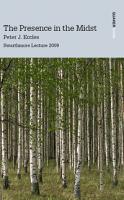The 2009 Swarthmore Lecture, The presence in the midst: reflections on discernment, by Peter Eccles. Reviewed by Anna Sharman.
This is a book about discernment, how we use the experience of God as a guide to living our lives and making decisions, both as individuals and as Quaker Meetings.
The author is an experienced clerk. What is also important in this book is that he is a scientist (in fact, a mathematician). When he sets out to write about God’s will, he doesn’t start from assuming that God or God’s will exist but first sets out to examine the evidence from first principles. He covers the Big Bang, the evolution of life and humans and theories of consciousness, to reach an understanding of how ‘God’s will’ can be fitted with a scientific view of reality.
Some Friends might consider skipping some of this, but I found it refreshing to have these questions examined in such depth from a scientific point of view.
In the first half, Peter Eccles does a masterful job of summarising the whole of the history of the universe, philosophy of science and religion and theories of human consciousness and free will, all in only a few dozen pages. He feels uncomfortable with the view of God as ‘a perfect, good, eternal, omnipotent, omniscient being’ who created the universe as a home for humanity and who rewards good deeds and punishes bad ones. I feel the same, and I love being part of a Society that allows awkward questions like ‘But what do you mean by God?’ while still leaving room to value the spiritual side of life. Peter’s conclusion about free will and God’s action involves ‘hierarchies of complexity’. There is a level at which consciousness acts, at which we make decisions and at which God might influence us, that cannot be explained by lower levels such as brain chemistry. Peter says he doesn’t fully understand this, and, somewhat disappointingly, ends up concluding that our choices are real, even if (after all this) he cannot prove it.
In the second half, about decision making, particularly in Quaker contexts, Peter gives an interesting view on how some difficult decisions were made at Yearly Meeting (for instance, whether to join ecumenical bodies and whether to withhold tax for military purposes). He focuses on how the decisions were made, not on the facts and arguments. Ways of moving forward when there is no unity are discussed, such as acknowledging in the minute that some Friends disagree with a decision. The process of making a decision using the Quaker Business Method is never complete: even when an apparently final decision is made, it can be reviewed after a period and refined or even overturned.
Much of this half of the book is restatement, though a good one, of Quaker decision-making processes. Peter reiterates the view that if you are nominated for something, you should consider only whether you have time to do the job, not whether you are able (because you should trust the nominations committee to have discerned this), and not even whether you are willing. Here I must disagree with him, knowing from experience that the decisions nominations committees make are not infallible.
This is a book full of nuggets of insight. It also has occasional flashes of a lovely personality, someone who can laugh at his own idiosyncrasies but be straightforward about the good decisions he has made. I was particularly touched by his determination that, even when his work as a lecturer means he is always busy, he must always be ready to listen to a student in distress.
The Presence in the Midst: reflections on discernment, by Peter Eccles is £8 and is available from the Quaker Centre Bookshop.
This article first appeared in The Friend.

As a result of reading this review, I decided to read the lecture and I am glad that I did. Although it suffers far too much from the academic style, e.g. having too many cited quotations, it is an enjoyable and informative read.
I cannot say that I agreed with everything. Although I do not have Peter Eccles experience of clerking extremely large Meetings, I was concerned about his method of preparing a range of final minutes, aiming to choose one when the discernment process was complete. Also, I am not as enamoured as he with the idea of increasing British use of meetings for clearness.
That said, I agree with Anna Sharman, the lovely personality (e.g. in his description of Blackpool Meeting and Preston Monthly Meeting) and the nuggets of insight together make for an enjoyable vehicle for explaining how the Presence in the Midst is essential to the Quaker decision-making method.